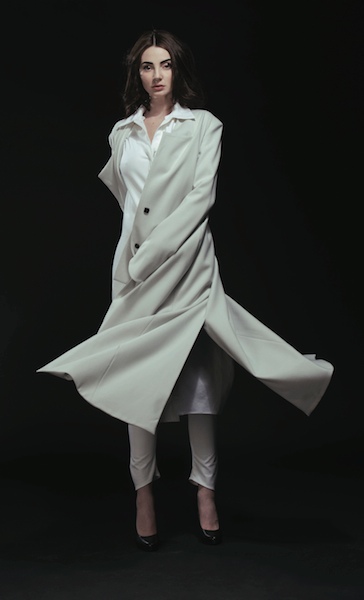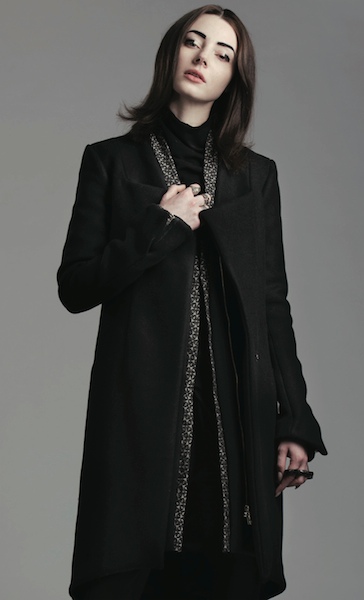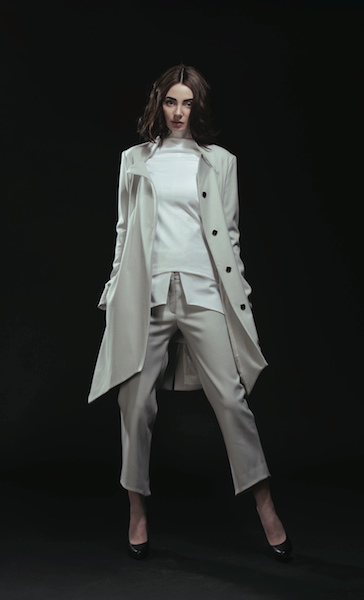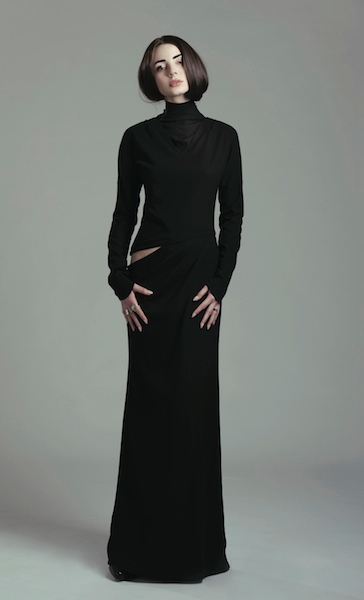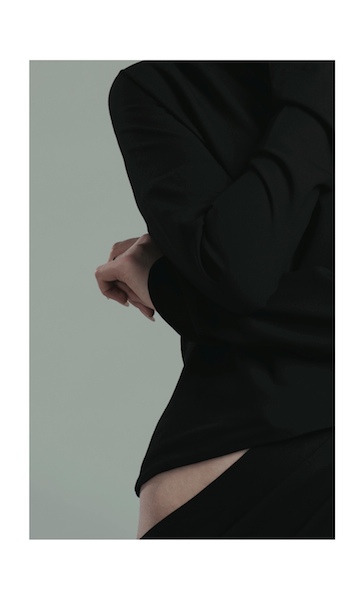N: Julia, how are you today?
J: I’m good. A little bit tired, you? (laughs)
N: Same. I’m sure you’re also tired of this question, but I’m still going to ask: You won the Annabelle Award in 2012 for your collection ‘Pinky’s Dream, Watch The Room’. Two years on, what consequences – whether positive or negative – has this had for your career?
J.W: Not much negative happened after that, because you win something that provides you with the resources you need to get on with work and to learn from someone who’s been in the industry for much longer than you and, therefore, has much more experience. While this, i.e. doing an internship at a big label, might also happen to you without winning an award, you’re rarely ever paid. This makes it difficult to finance your life and Annabelle provides you with different aspects you need to do this in a safe environment so you can really concentrate on learning. The only thing that was difficult at times was what was growing out of it. There was quite a lot of attention regarding what the next collection was going to be about, although I was never really thinking about it.
N: Was it a lot of pressure?
JW: Yes. You draw anyway, and what you draw could be the next collection if you wanted it to be, but you never actually think about it until you actually do it. So this aspect was a little difficult for me.
N: How come it wasn’t your goal to make another collection straight after?
JW: Because I first wanted to take some time – after three years of very stressful studying. ESMOD is a very hard school, just like Central Saint Martins or the Royal Academy of Art in Antwerp. You leave university having learnt the skills you need to design a collection, but not the skills you need for the business side of things. I wanted to sit down, relax a little, learn this and do that but then I had to do it all at the same time, which I didn’t want to but it would not have been very intelligent to say no to it. This was the difficult aspect of it. Not negative, but difficult.
N: Do you still feel there’s an influence from this award in your career nowadays?
JW: Not from the award, but from Barbara Bui herself. I mean, after a while there’s a new award, new people winning it. But what I learnt during my internship helps me very much to this day.
N: Would you say that’s mosty the practical side?
JW: As well as how the people were. You constantly observe when you look at people; how they are and how they manage their job. They also had a very stressful life until the point where they’re working in the position they are now. Why are they working there? How did they manage? How did they get the job they have? I find it interesting that people who are working there are of very different characters. It’s like day and night.
N: You’re originally from Zurich, studied at ESMOD in Berlin, have worked in London for Thu Thu and , as mentioned before, in Paris for Barbara Bui. Where is your current home and how do you define the term in general?
JW: I’m lucky to have my studio in Berlin attached to my flat so all I got to do is walk into my studio with a coffee in my hand and start working. That’s my home. Some people would find that difficult, in the sense of not being able to shut down your brain – for me, it’s not. It’s nice that it’s so close. This is where I’m the boss, this is where I close the door, these are my four walls and this is my home, just my home. There are a couple of other homes, though. There’s a home where my sister lives, a very important person to me, there’s a home where my best friend lives, whom I know since I was twelve. I wouldn’t say my home is my only one, but it is the main one, the most important one, and the rest is kind of everywhere.
N: If asked to highlight your own strengths as a designer – what would they be and do these have equivalents to other parts of your day-to-day life?
JW: Good question! I think I ask a lot, which annoys me, but then it’s good. It annoys me that I can’t just leave things be. When you designing it needs to be better. It needs to be more than what you had in mind. What I had in mind is not enough. It’s not the exact shape yet, it’s not the exact volume, the collar isn’t fitting and then you could also not do this because you had that in mind but the time is too short so how are you going to do it? This is something that freaks me out, though it’s healthy for your work because it’s how you get the most out of what you wanted to achieve. But this has not so much to do with my private life.
N: You don’t ask so much in your private life, then?
JW: I do, but not annoyingly. I don’t know. Maybe I do! This, I don’t know! (laughs) In my private life, I’m more of a hippie, that’s like, you know, living let live, because that’s what I’m convinced of. I would not be like: why do you do this? Are you sure you want to do it that way? Why, why, why, why, why? Not so much! If you feel you got to do it, then do it and if it doesn’t work out then whatever.
N: Who do you ask in your professional life?
JW: Everyone. Almost everyone. Mainly from the business side I have to ask — I have a lot of people, mainly from other fashion labels, helping me. I have my mother to ask how I could finish a garment, which is very uselful. But if you ask too many people it can get confusing.
N: Do you ever ask yourself?
JW: A lot! All the time.
N: Music is one of your biggest inspirations. How does it get through the process of designing a collection? How is it reflected in your designs?
JW: It’s basically a kick-off , it’s how I start to draw. Rarely I see a picture and then I’m like, ooooh! I don’t think of shapes that much, because I’m not a fan of taking what exists already and just print something on to then say it’s my collection. I mean I’m here to bring something – nothing is new anymore, but to do something, which is mine and not someone elses. This I can only do through music. You can say what you want but you listen to the music you like. Your boyfriend might be listening to the music that he likes then this is doing something that nobody can really, really deeply understand. They can tell you what they feel and they can explain it to you, but they only know it themselves. It’s something linked to me in a very basic manner. Something that comes out of me, and this is how I design.
N: How do you reflect the musical influence in your designs?
JW: In every little aspect; it’s the whole which reflects the music. It’s the mood of the collection but also the mood of the show. Music tells you more and it’s in every little detail.
N: What are you listening to at the moment?
JW: For the new collection it was Telefon Tel Aviv – a band that doesn’t exist anymore because one of the guys died a couple of years. Well, one guy still makes music but not as good as they used to together. Their old stuff is really good.
N: Still or sparkling?
JW: Still.
N: You were part of the International Fashion Showcase London in collaboration with the British Council, British Fashion Council, Mode Suisse and DASH Magazine for two consecutive years now. How do you estimate prestige and power of such an event as an international launching platform?
JW: Prestige and power? I’m not sure about the prestige but I am very sure about the power part because how else do you want to do it? This is the platform that gives people the opportunity to show their designs and it could happen that at such a small platform you see someone doing such amazing work that this becomes your discovery, which then motivates you towards the possibilities to do something, whatever person you are and whatever way you might be.
N: You have repeatedly showcased your collection at Mercedes-Benz Fashion Days Zurich. Is this a good market for emerging design?
JW: It is. I don’t know about the other designers but for me, yes. It’s a gathering of people who should see your collection, who want to see it. As Zurich is not too big, you can gather them at a single place, so for me it’s very important.
N: Studio Winkler’s Autumn / Winter 15 collection – those close-ups of zips, seams and lines. Can you tell us a bit more of what’s to come next winter?
JW: It’s much quieter and sublte than the last one. Merely out of the inspiration, it doesn’t have directly to do with culture; it’s also about music. It’s more concentrated on hemlines, volumes and sharp lines and patterns because that’s what I want to put out. I concentrated more on that. Having found volumes, which work very nicely with the woman’s body, no matter which body shape you are.
N: We’re in Verbier at the Veuve Clicquot chalet, where you’re one of the special guests. What’s the primary aim for you to be here and what do you want to get out of this day?
JW: It’s basically… to be very honest; when I graduated we got very, very drunk on this champagne. We were drinking a lot for a couple of weeks. I had quite an intense experience with this one. I just find the frame very nice. I find it nice that they’ve put this together in that way; that they’re inviting different people who I don’t have anything to do with. There are no boarders. It brings people together in a frame, which I find very relaxing, not forced. It’s the frame that I like very much. So this is a very, very good idea.
N: Good. Thank you very much!
JW You’re welcome!
Interview: NoéMie Schwaller
